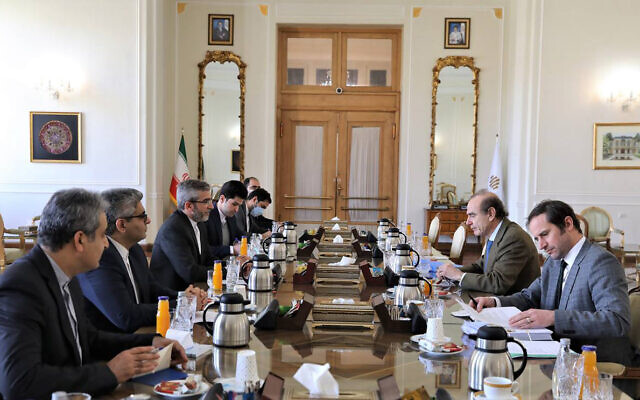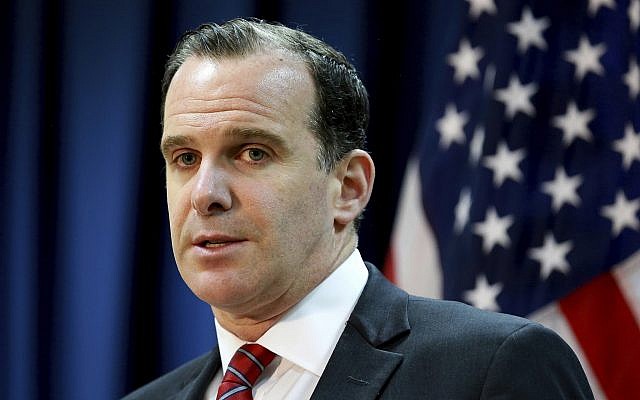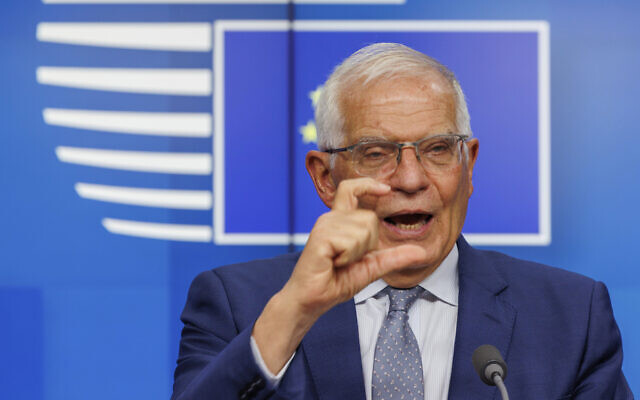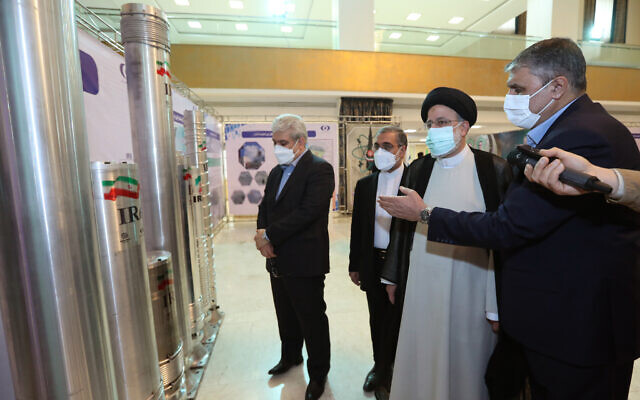Brett McGurk, WH National Security Council Middle East coordinator, says US may use sanctions and diplomatic isolation without ‘needlessly’ escalating situation, Axios reports

A senior Biden administration official reportedly believes that reviving the multilateral Iran nuclear agreement would be “highly unlikely” in the near future.
The prognosis was made last week by White House National Security Council Middle East coordinator Brett McGurk during a briefing call with a group of think tank experts, according to a report Wednesday by the Axios news site.
Since his inauguration, US President Joe Biden has sought a joint US-Iran return to compliance with the 2015 accord known as the Joint Comprehensive Plan of Action (JCPOA). The agreement gave Iran relief from sanctions in return for limits on its nuclear program to prevent it from obtaining nuclear weapons, a goal Iran denies it seeks. The pact steadily unraveled after the Trump administration pulled the US outin 2018 and slapped Iran with stiff sanctions — a move that Israel enthusiastically supported.
In response, Iran dropped its own commitments to the deal, boosting the program and increasing uranium enrichment beyond levels set in the deal.
Talks in Vienna that started in April 2021 to restore the deal have stalled since March amid differences between Tehran and Washington on several issues. The two sides negotiated indirectly through the European Union coordinator.
Qatar hosted indirect talks last month between the United States and Iran in a bid to get the process back on track, but those discussions broke up after two days without any breakthrough.
One of the main sticking points is Iran’s demand that the US remove the Islamic Revolutionary Guard from its list of foreign terror organizations, which Biden has so far refused to do.

On Tuesday, the EU’s foreign policy chief said he has submitted a draft text of the deal to renew the accords, urging all parties to accept it or “risk a dangerous nuclear crisis.”
Writing in an op-ed in The Financial Times, Borrell said that after more than a year of negotiations, the sides have reached “the best possible deal that I, as facilitator of the negotiations, see as feasible.”
Borrell acknowledged that the Iran deal “remains politically polarizing in Washington as the midterm elections approach” and that it “may not have addressed all US concerns with respect to Iran.” He also acknowledged that there are “serious reservations” in Iran.
But he argued that the deal carries very significant benefits. “If the deal is rejected, we risk a dangerous nuclear crisis, set against the prospect of increased isolation for Iran and its people,” Borrell wrote. “It is our joint responsibility to conclude the deal.”

US officials also acknowledge that the window for a deal is closing, given the progress Iran has made in uranium enrichment and nuclear R&D over the past several years. Biden said, while in Israel this month, that he would not “wait forever” for Iran to accept the agreement that is on the table.
But Washington has also been careful not to close the door entirely on the possibility of a deal, due to fears that it will only lead to escalated Iranian activities in the region. Tehran has also refrained from taking the more provocative step of enriching uranium to 90 percent.
McGurk served in several previous administrations, including Republican ones, and is seen as representative of a more hawkish wing of the White House. He is countered in the administration by a more dovish wing led by Special Envoy for Iran Rob Malley, who was one of the JCPOA’s original architects. But if the Axios report is accurate, he would become the first administration official to provide such a dire forecast of the US chances for success.
Speaking to think tank experts last week, McGurk speculated that Iran has held off on responding to the US offer for a joint return to compliance with the JCPOA because it wants “to add something to the pot” in order to blunt criticism from regime hardliners who oppose the deal. He added that the US was “not going to do that.”
McGurk said the Biden administration will likely focus on using sanctions and isolating Iran diplomatically while “not needlessly escalat[ing] the situation,” Axios quoted McGurk as having said, unless the use of force is absolutely necessary. Earlier this month while in Israel, Biden said he would use force against Iran as a “last resort” to prevent it from obtaining nuclear weapons, but stressed his preference to negotiate with the Iranians instead

The senior Biden official said that the US and Israel do not differ on the need for a possible military strike against Iran, but rather over whether it would be best to return to the original 2015 agreement, as the US believes, or negotiate a “longer and stronger” deal, as Israel would want.
US officials argue that Jerusalem’s demand on the matter is unrealistic. The White House declined to comment on the Axios report.
Israel has repeatedly said it reserves the right to act independently against Iran’s nuclear facilities to prevent an existential threat to the Jewish state.
On Tuesday, Defense Minister Benny Gantz said Israel has the ability to cause serious damage to Iran’s nuclear program, and warned that reviving the nuclear deal will only be a delaying tactic.
“Iran is a global problem. It is not just Israel’s private problem,” Gantz said.
As reported by The Times of Israel
